- Home
- Nicholas Antinozzi
Stealing Second (The Amendments Book One 1) Page 2
Stealing Second (The Amendments Book One 1) Read online
Page 2
“I’m closing up,” Carrie said. “We’ve got to get out of the city.”
“Good idea,” said Pete. “Let’s go home and load up. We can head up to Mike’s place in Milaca. We should be safe up there for the time being. Gary, you’re welcome to join us. Mike is my brother. He’s a good guy.”
I didn’t have a car, and after seeing what had happened on the television, I nodded my head. “That would be nice,” I said, stupidly. “Are you sure he won’t mind?”
Pete slapped me on the back. “I’m sure,” he said. “Just boogie your ass on home and pack a bag. You’ve got ten minutes. I’ll help Carrie lock up and we’ll pick you up outside your building. Keep your head down.”
I nodded and stepped off my barstool. My buzz was nearly gone by the time I arrived back home.
I lived alone and while the apartment wasn’t much, it contained nearly everything I owned. I ran to the bedroom and began unpacking drawers and setting stacks of clothes on my unmade bed. Here is where I first began to regret not having a plan. On some level I had known things were about to turn sour. Red flags had been flying for years, but like so many others, I had stuck my head in the sand. The time to bug out had arrived and I didn’t have a clue what to pack. I stared at myself in the mirror. I was thirty years old and was already starting to get a beer belly. I’ve been told I’m handsome, but I don’t see it. I have short black hair and an average face. The green-eyed man in the mirror was six feet tall, but he was bloated and looked scared to death.
I began stuffing clothes into a duffel bag, and ignoring Pete’s advice I called my folks. I’m glad I did. Mom answered and we talked for a minute. After assuring her that I was okay, she handed the phone to Dad. He told me that my sister, Cheryl, and her family were on their way up to the farm. He told me not to worry, that the house was clean in case they had visitors. I didn’t have to ask what he meant by that. As I continued to pack, I explained where I was heading the best I could. He told me that as soon as things cooled down, he and Mom wanted me out at the farm. I promised him that I’d get there.
That was it. While we were always a close family, we were tightlipped about our emotions. I don’t remember my folks ever telling me they loved me; it was a given. I never felt that was odd, it was just our way.
I filled both of my duffel bags with clothes and toiletries. I added my favorite pillow, a sleeping bag and a few books I had yet to read. With time running out, I stuffed canned foods, bottled water and some cookware into my bags. My thoughts were that if things got really bad, I could walk to Pine City. The last things I grabbed were a few photographs of my family and the rest of the cash from out of my sock drawer. I then lugged my bags out into the hall, locked the door and walked down to the parking lot. Pete and Carrie showed up a minute later. I tossed my bags into the back of his Chevy pickup and I hopped in.
“Have you heard the latest?” Carrie asked.
I shook my head as Pete sped out of the parking lot. “The last thing I heard was when we were at the bar.”
Carrie reached up to the dash and turned on the radio. She then twisted the dial and we were rewarded with nothing but static. “They shut down the television stations while we were at the bar,” she said. “Does your cell phone still work?”
“Yeah,” I said. “I just got off the phone with my folks.”
Pete turned to face me. “What did you tell them?”
“I just told them I was getting out of town. I couldn’t just leave and not let them know.”
I thought Pete was angry, but he nodded his head. “Does your phone still work? We lost our signal a couple minutes ago.”
I reached into my shirt pocket and removed my old flip phone. The screen showed no reception bars. I shook my head. “It doesn’t look like it,” I said. “I don’t have any bars.”
“I knew that would happen,” said Pete. “They don’t want us communicating with each other. They want to keep us in the dark.”
“Those bastards,” grunted Carrie.
Our next stop was at their house, a faded double bungalow on Pierce Street. Up and down the block, people were loading up their cars and trucks. The air was full of shouting voices and crying children. I did my best to ignore them. Pete and Carrie packed, and I shuttled their bags out to the back of the Chevy. The pickup had a topper and I loaded the back as high and tight as I could. Pete joined me but instructed me to stay where I was. He handed me a snub-nosed revolver. “I’m bringing out my guns. Stay here and if anyone gets too close, you show them this. If there’s trouble, just start shooting.”
“Are you serious?”
“Gary, look around you,” he said. “I’m dead serious. Pack the guns on the bottom of the load. I don’t want anyone to see them if we get stopped. Do you know what I mean?”
I nodded. A minute later, Pete began carrying out his weapons. He had wrapped them in blankets, but anyone with half a brain would have known what he was up to. If a Minneapolis cop were to turn down the street, we would be caught red-handed. Still, it wasn’t the police I was most worried about. From inside the back of the truck, I began to notice some of the neighbors taking an interest in what Pete was doing. I worked as fast as I dared, pausing every twenty seconds or so to survey the street. The afternoon was warm, and I was sweating like a pig by the time we finished. Thankfully, nobody bothered us. I closed the tailgate and shut the topper. Pete locked it up and soon we were back on the road. I tried giving Pete back the revolver, but he told me to hang onto it.
Despite sticking to the back roads, it took us nearly two hours to get out of the city. Traffic crawled along at a snail’s pace until we got outside of Elk River. From what I could tell, it seemed like most businesses had shut down for the day. The further north we traveled, the fewer we saw that were still operating. The normally full parking lots were Christmas Day empty. When things opened up on Highway 169, the traffic hustled along at close to ninety miles per hour. We talked about many things, but mostly we speculated what the future held in store for us. Pete was absolutely certain that we were going to be rounded up and locked into internment camps. “Forced labor,” he had said. “They’re still going to need some of us to keep the wheels turning.”
Carrie thought that the government would have second thoughts about kicking this hornet’s nest and that eventually they would stand down. “Look at these people,” she said. “You can bet they’re all armed and ready to fight. I’ll bet this is going on all across the country.”
“I hope you’re right,” I said. “I don’t want to go to war with our own people.”
“Well,” said Pete, “I don’t think we’re going to have a choice. We’re not going to roll over and play dead for these bastards. If I know my brother, he’s ready for them. Mike’s a badass, but you’ll like him. He’s been warning me about this for a couple years.”
“I’m not worried about Mike,” said Carrie. “I just don’t like his friends.”
“They’re a little rough around the edges, but they’re good people,” said Pete, who was looking at me. “You’ve got to let it go, Carrie. These guys might save our bacon.”
Carrie turned to me. “Mike and his friends are paramilitary, preppers, you know what they are, right? They’re pretty hardcore. I just want you to be ready for them. Some of his friends can really be assholes.”
I nodded. I knew what preppers were; at least I thought I did.
“They’re not that bad,” said Pete. “Put a sock in it. You’re gonna scare Gary, and we’re all plenty scared the way it is.”
Red brake lights flashed in front of us and Pete quickly slowed the Chevy. We were about a mile south of Zimmerman and traffic soon ground to a halt. After sitting for what seemed like an eternity, a Sherburne County Sheriff’s cruiser roared past on the shoulder. That car was followed by another, this one belonging to a Minnesota State Trooper. Neither car had on its emergency lights or siren.
“I don’t like this,” said Pete.
“What can we do?” a
sked Carrie.
I saw some people get out of their cars and walk to the shoulder to see what was going on. A man holding a pair of binoculars began to frantically gesture up ahead. “This doesn’t look good,” I said. “I’m going to go take a look.”
“I’ll join you,” said Pete. “Stay here,” he said to Carrie, “we’ll be right back.”
Pete and I got out of the truck, and as far as I could see, traffic was stopped behind us. Others were getting out of their vehicles and a few were openly brandishing firearms. Up ahead, there was the sound of a gunshot. We walked to the shoulder and joined about a dozen men. The man I had seen gesturing ahead was explaining what he saw. “They’ve got the road blocked,” he said. “They’re searching cars, and it looks like they’re loading people into those buses.”
I could see down to the stoplights and sure enough, there were about half a dozen squad cars parked across the intersection with their lights flashing. Parked nearby were at least ten yellow school buses. I looked at Pete and shook my head. “This is bad,” I said. “We’re all blocked in. What the hell do we do now?”
“Look at that crazy bastard,” someone said, pointing up the highway. A rusty Ford Explorer had nosed its way out of line and had jumped the median. The SUV bounded into the empty southbound lanes of traffic and began to speed toward the roadblock. We all scrambled across the highway and stood in the median, watching the green Ford race toward the traffic light.
The short guy with the binoculars crouched down in the grass and held the binoculars up to his eyes. “He’s not going to make it,” he said, just as another SUV sped out of line and followed the Ford up across the median and onto the southbound lanes. Before the Ford was halfway there, ten more cars and trucks were following their lead. There was the sound of gunshots. I could barely see the Explorer, but I could see that it was in trouble. The green Ford began to swerve wildly, and a second later I watched in terror as it flipped over and began to barrel roll. The Explorer ended up upside down on the shoulder. The other vehicles continued to speed after it, and the air was full of the sound of exploding gunshots.
“Oh my God,” said the short guy. “They’re shooting the hell out of those people!”
By this time there was a steady stream of vehicles crossing the median. From ahead of us and behind us, glimmering in the afternoon sunshine, cars and trucks were jumping the median and taking their chances in the southbound lanes.
“Somebody just shot a cop!” shouted the short man. “There goes another one. Holy shit! We’re shooting back! A car just got through, there goes another one. They’re breaking through!”
Pete grabbed me by the shoulder and pointed to the Chevy. “Let’s go for it,” he said. “I don’t want to wait around to see what happens next.”
We weren’t alone. Everyone began to scramble back to their vehicles. I hopped back inside next to Carrie and strapped in. “What’s going on?” she asked.
“There’s a roadblock up there,” I said. “People are going around it in the southbound lanes.”
“And that’s exactly what we’re going to do,” said Pete. “Carrie, I want you to get down on the floor.”
Carrie shook her head. “I want to see this,” she said. “I’m not hiding.”
The Dodge pickup in front of us suddenly roared to life and plowed into the grassy median. Pete shifted into drive and followed the Dodge. “Damn it, Carrie,” he roared. “Why do you have to be so stubborn? Please, put your head down. Those cops are shooting up here!”
We were passed by a BMW that was going well over a hundred miles per hour. I saw the driver and passenger both held handguns out their windows. I’d never seen anything like it, not in real life, and I opened the glove box and retrieved the revolver. I stuck it out the window in my right hand and said a prayer. Up ahead, a conversion van was dodging traffic, obeying the law, but going against the grain. Pete narrowly avoided the van, but a second later, I heard a loud crash behind us. I stared at the stopped traffic in the northbound lane and watched as men and women urged us on. I looked ahead, only to see the BMW skidding sideways on the asphalt. Like the Bronco, it was soon flipping into the air and rolling down the road. I watched as one of the men was ejected and closed my eyes, not wanting to see his fate.
“Get down!” shouted Pete.
Carrie roared something, but she put her head between her legs. Almost immediately, a bullet crashed through the windshield and slammed through the back of the cab. The bullet would have killed Carrie, I was sure of it. I began to fire wildly out my window. I watched as a mob rushed the roadblock on foot, angry men armed with shotguns and hunting rifles. A bullet slammed into the box and another tore at the door skin, directly underneath my outstretched arm. Carrie screamed. That was when I realized I was pulling the trigger of an empty gun.
We passed the BMW, which had landed on its flattened tires, and I made the mistake of looking at the body in the road. The man had been decapitated, and he lay unnaturally twisted on the shoulder. There was no sign of life inside the overturned Explorer. Smoke billowed up from the hood and flames licked up at the crumpled fender. The smell of spent gunpowder filled the cab. Another bullet crashed through the windshield, and I heard it whiz past my ear.
We hit the intersection and I stole a look up the main drag of the small town of Zimmerman. Speeding toward the intersection was an olive green convoy of military vehicles. Following the lead of the others, Pete drove about half a mile before bouncing back across the median and into the northbound lanes. Carrie sat up and stared at the bullet holes. A Dodge Challenger roared up next to us on my side, and the man behind the wheel stuck his thumb in the air. The Challenger was soon rocketing ahead at a breakneck speed. We had made it, but we could only imagine what type of danger waited for us up ahead.
“I love you,” cried Carrie. “You saved my life.”
“I told you to listen to me,” said Pete, fighting to see through the shattered windshield.
“How’s the temperature?” I asked. “Did they hit the radiator?”
“The temp is still normal. I think we lucked out. Did you see that convoy? They’re gonna shut that intersection down.”
“I could’ve been killed,” gasped Carrie. She held her finger up to one of the bullet holes and drew it back to her forehead. “I can’t believe this is happening.”
“I can’t believe it, either,” I said as I returned the revolver to the glove box. “How far is it to your brother’s place?”
“About twenty miles,” said Pete. “I’m wondering if we should try some back roads.”
“Find some back roads,” said Carrie. “If the police see this windshield, they’ll know we ran the roadblock.”
Pete nodded and took the next left. We followed a narrow highway for about five minutes until we found another secondary road. For the next half hour, we followed that road to the north. Now and again, we would be passed by cars and trucks flying by us at high rates of speed. Pete would move over as far as he dared as they raced by. I could tell he wanted to follow, but the shattered windshield prevented us from giving chase. Pete took another series of turns and I was hopelessly lost.
Chapter 3
Finally, when I thought we couldn’t get any deeper into the boondocks, Pete turned into a long driveway that had been cut into the woods. Two armed men dressed in camouflage stepped out in front of the truck. The larger of the two stepped over to Pete’s open window and peered inside. He was a wide-faced man with black hair, bad teeth and sparkling blue eyes that looked genuinely happy to see us. “Brother Pete,” he said, joyously. “Mike is going to be so damn happy to see you. He’s been worried sick about you guys.”
“Hey Donnie,” Pete said. “We had a helluva time getting out here. Traffic was a bitch. I’m just glad that’s over.”
The other man stepped up to my door and he held out a hand. “Rob Harness,” he said. Harness was tall and gangly and looked to be about fifty. He had long brown hair and a straggly beard streaked with
gray. “Looks like you folks saw some action, huh?”
I shook his hand and tried to smile. “You might say that. We had to run a roadblock back in Zimmerman. It got a little crazy. I’m Gary Smith, this is Carrie Bronson.”
Harness nodded. “We’ve met,” he said. “How are you, Carrie?”
“I’m good, Rob. How many people made it up here?”
“I think we have about fifty. But Mike said we could expect as many as a hundred. People have been showing up all afternoon.”
The guy named Donnie was on a two-way radio. He slapped the roof of the Chevy and said, “Go on up,” he said. “Mike is waiting for you.”
“Thanks Donnie,” Pete said. “Catch ya later, Rob.”
The driveway was almost half a mile long and opened up into a wide meadow. The house, what I could see of it, was a berm home built into the side of a hill and covered in green grass; it looked like something out of fairy tale. Off to my right, cars and pickups were parked nose to tail at the edge of the woods. Behind Mike’s house was a large tin pole building. What appeared to be RV trailers were parked beyond that, but they were rust colored, and from where I sat, I assumed they were junk.
I had no problem recognizing Pete’s brother. Mike came jogging up from the pole building, a shorter version of his younger brother. They had the same hair and beard, and the family resemblance was uncanny. The only noticeable difference was that Pete was a good six inches taller than Mike. Pete slapped the gear-shift into park and turned off the ignition. He hopped out of the Chevy and jogged down to greet his brother.
“Be careful what you say around these guys,” whispered Carrie. “They’re paranoid as hell and I’m sure they’ll be watching you like a hawk. They don’t like strangers.”
I turned to Carrie and shook my head. “You know,” I said, angrily. “You and Pete could have told me this before we left Minneapolis. I don’t need this shit. I could have tried to make it out to our farm. I think it’s only about fifty miles east as the crow flies.”

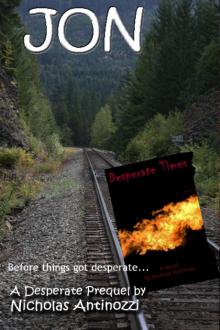 Jon...A Desperate Prequel
Jon...A Desperate Prequel Superior
Superior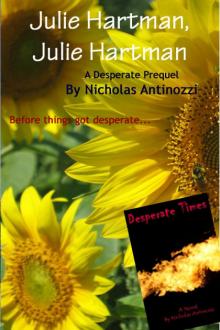 Julie Hartman, Julie Hartman
Julie Hartman, Julie Hartman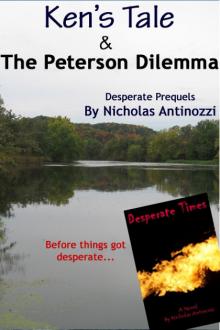 Ken's Tale & the Peterson Dilemma - Desperate Prequels
Ken's Tale & the Peterson Dilemma - Desperate Prequels Bits And Pieces
Bits And Pieces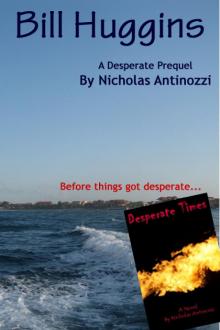 Bill Huggins - A Desperate prequel
Bill Huggins - A Desperate prequel Odd Whitefeather
Odd Whitefeather Brindle's Odyssey
Brindle's Odyssey Desperate Times
Desperate Times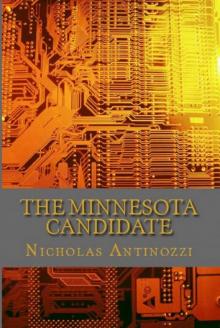 The Minnesota Candidate
The Minnesota Candidate Bunkers
Bunkers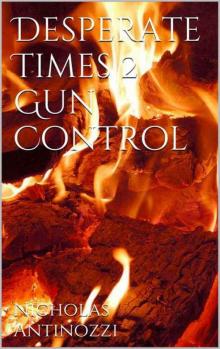 Desperate Times 2 Gun Control
Desperate Times 2 Gun Control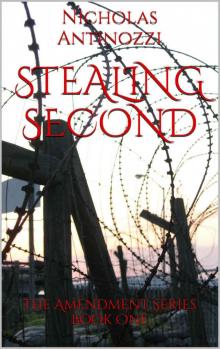 Stealing Second (The Amendments Book One 1)
Stealing Second (The Amendments Book One 1) Desperate Times Three - Revolution
Desperate Times Three - Revolution